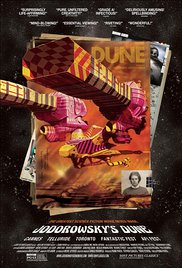 Jodorowsky’s Dune (2014)
Jodorowsky’s Dune (2014)
Dir: Frank Pavich
Stars: Alejandro Jodorowky, Michel Seydoux, H.R. Giger and Gary Kurtz
I was really impressed with this documentary because it does such a fine job of describing the challenges and heartache of film development. I mean, films don’t just happen. There are a lot of filmmaking terms thrown around, and because so many films fail to come to fruition and so many filmmakers are such knuckleheads, I’ve seen people roll their eyes at the term “development.” But, this is as real a term as direction, acting or production. It means the initial construction of a film, literally taking an idea and getting it started on the process of being made and ultimately shared with an audience. Development can include the assembly of a story idea into script form, the long and draining process of raising money, the signing of known actors for roles, the lunches required to woo a hot director to consider the project, a combination of all of these – and much more…
In the case of Dune, you have to know a little about Alejandro Jodorowsky first for the documentary to make sense. When you think of successful films, like the DVDs that live on your shelf at home, how did you first hear about them? Many times it’s word of mouth, where your friends are so excited to have seen The Nice Guys, they just have to tell you about it. Or, it’s a story you’re familiar with that is finally coming to screen like Gone Girl. Maybe the “shout” to the film is so loud you are obligated to go see it, like Avatar or one of the Star Wars films. Maybe you’ve found a recent gem because Netflix recommended it to you? OK, less likely.. But, what if one of your favorite musicians or actors or politicians endorsed the film? That’s what happened to Mr. Jodorowsky.
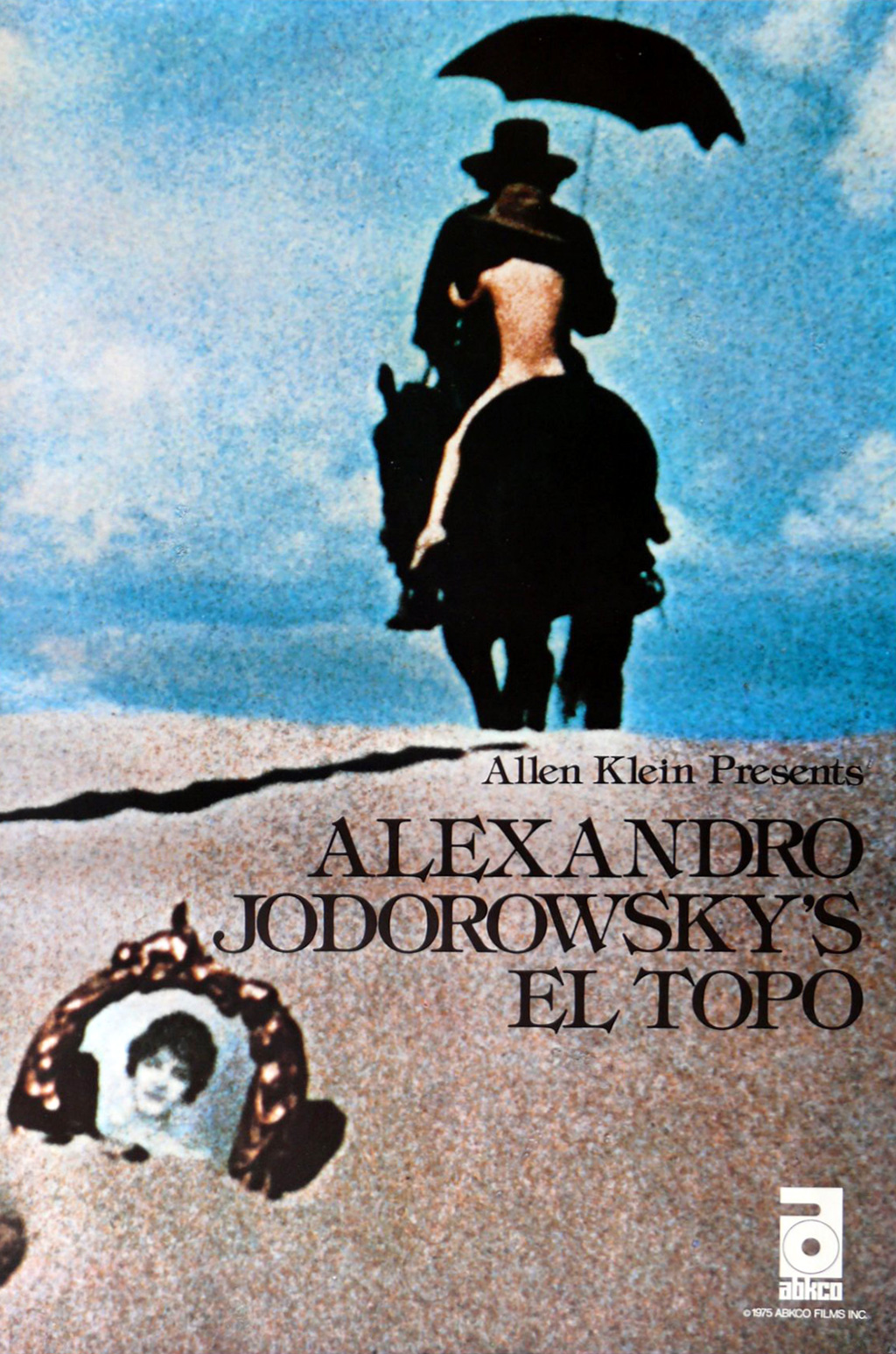 In 1970, he released a bizarre, epic film called El Topo. It’s basically about this messianic figure rolling around the Mexican desert looking for – you know what, I don’t know what it’s about. On the poster here, that’s AJ’s naked son riding bareback with him, as El Topo, by the way.
In 1970, he released a bizarre, epic film called El Topo. It’s basically about this messianic figure rolling around the Mexican desert looking for – you know what, I don’t know what it’s about. On the poster here, that’s AJ’s naked son riding bareback with him, as El Topo, by the way.
Any-hoo… this is one polarizing picture. Some people were ready to riot and demanded their money back when it was released. Others, particularly those who were experimenting with new, psychedelic experiences, thought this was the title to give birth to a new era of cinema. One of those folks was no less than John Lennon. Yes, right, John – from the Beatles! Calm down. Well, with such an endorsement, midnight shows across the nation started showing El Topo. And it did good business. Keep that note in mind – El Topo did good business. That’s how AJ got as far as he did, his work was making money and finding an audience.
Based on its good business, a French producer named Michel Seydoux took El Topo and screened it in Europe. Did well there, too! So, they made another film together called The Holy Mountain. Quick sidebar – I vouch for none of Jodorowsky’s films because I haven’t seen them. The little footage I have seen leaves me… interested, curious, skeptical, doubtful. Regardless, Seydoux asks Jodorowsky after the success of Holy Mountain, “What’s next, buddy?” (the French are always using the term, “buddy,” not sure if you knew that). And AJ says, “I wanna make Dune.”
This is that part in the documentary where I lean in. This is the title of the film, there’s going to be some superior insight, right? There’ll be some reason Jodorowsky picked this project to develop, pre-produce, produce, post-produce and screen across the world, right? After all, that process takes about two to five years, all told, so it’s got to be worth it. And when the interviewer asked Jodorowsky why he picked Dune, he replied something to the effect of, “Well, I never read the book. But, I knew it was huge in its scope, it was an epic tale and I wanted to make it.”
Here’s where I start to get frustrated. This film, this entire project, is an ego play. Right from the get go. Now, that’s fine if the director embraces that spirit. If the director is making the film for himself and his audience, not as an hommage to a great novel, OK fine. Think Apocalypse Now. Coppola deserves a massive amount of credit for that vision, that “ego trip,” much of which he financed himself. But, I was absolutely gobsmacked by how many individuals who went “all in” to making this movie with AJ had never, ever even read the book it was based upon.
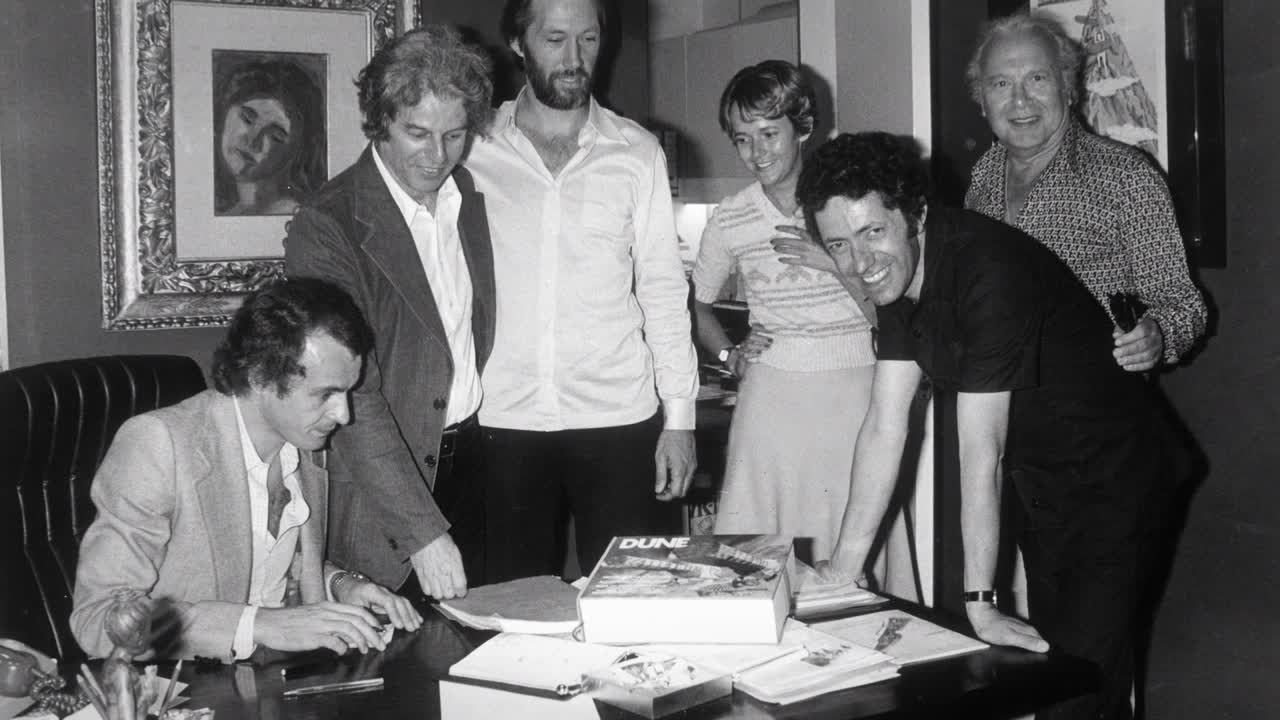 From here, the documentary becomes a filmmakers wet dream. Jodorowsky dazzles us with tales of meeting with Rolling Stones lead singer Mick Jagger, to entice him to play one of the leads. Keith Carradine (pictured above – you can see the book, too) signed on for a role. AJ astonishes us with the time he told the special effects designer of 2001 to go to hell because he wasn’t enough of a “spirit warrior” for AJ. Same feeling to that time he demanded the band members of Pink Floyd stop their eating and listen to his vision for Dune! And then there’s the numerous meetings with Salvador Dali – yes, the fucking painter – who AJ insisted was the ideal individual to play Paul’s father. Dali wanted a $100K an hour. Oh! I almost forgot, he also wrangled Orson Welles to play the emperor, because he promised the sizable, early 1970s Welles that his favorite Parisian bistro would cater the film. This, obviously, was the funniest edit in the whole film because after AJ says this on camera, they cut to a picture of a large, prominent Welles grinning ear to ear.
From here, the documentary becomes a filmmakers wet dream. Jodorowsky dazzles us with tales of meeting with Rolling Stones lead singer Mick Jagger, to entice him to play one of the leads. Keith Carradine (pictured above – you can see the book, too) signed on for a role. AJ astonishes us with the time he told the special effects designer of 2001 to go to hell because he wasn’t enough of a “spirit warrior” for AJ. Same feeling to that time he demanded the band members of Pink Floyd stop their eating and listen to his vision for Dune! And then there’s the numerous meetings with Salvador Dali – yes, the fucking painter – who AJ insisted was the ideal individual to play Paul’s father. Dali wanted a $100K an hour. Oh! I almost forgot, he also wrangled Orson Welles to play the emperor, because he promised the sizable, early 1970s Welles that his favorite Parisian bistro would cater the film. This, obviously, was the funniest edit in the whole film because after AJ says this on camera, they cut to a picture of a large, prominent Welles grinning ear to ear.
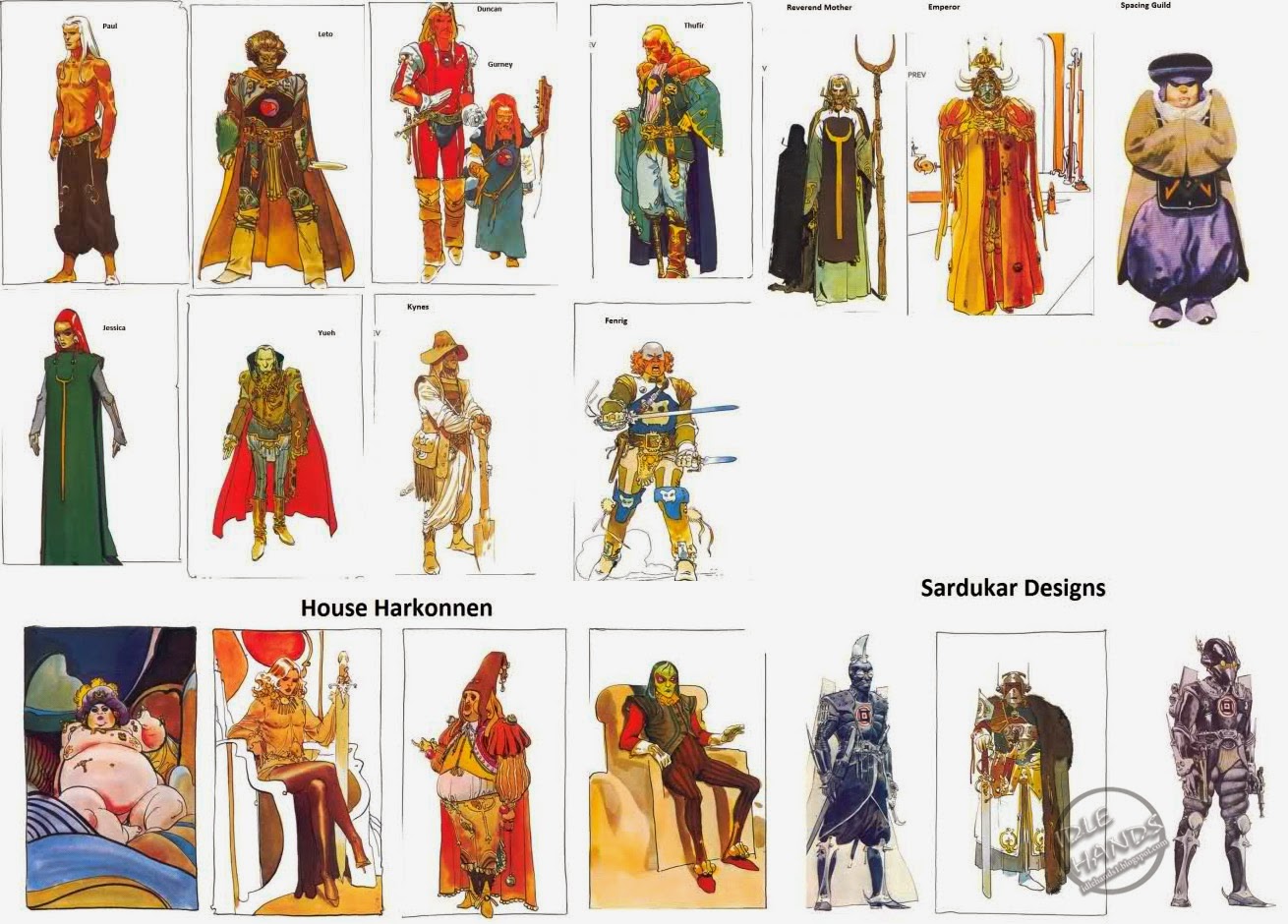 You can tell by now – these commentaries always end up longer than I intended – that I was thoroughly entertained by Jodorowsky’s Dune. Where I got frustrated was the portion of the film that focused on the Hollywood studios. For a movie of this scope, in the heart of the 1970s, AJ, Seydoux and the team – which included the likes of H.R. Giger and many other true craftsman, ready and standing by to start constructing sets and the like – were going to need studio money. Now, as soon as I think “studio money,” I think of one word – compromise. If you’re going to make a film with [insert studio name here], I don’t care if you’re me, you, Scorsese, Spielberg (yes, even Mr. Spielberg) or the next hot thing – you will need to compromise.
You can tell by now – these commentaries always end up longer than I intended – that I was thoroughly entertained by Jodorowsky’s Dune. Where I got frustrated was the portion of the film that focused on the Hollywood studios. For a movie of this scope, in the heart of the 1970s, AJ, Seydoux and the team – which included the likes of H.R. Giger and many other true craftsman, ready and standing by to start constructing sets and the like – were going to need studio money. Now, as soon as I think “studio money,” I think of one word – compromise. If you’re going to make a film with [insert studio name here], I don’t care if you’re me, you, Scorsese, Spielberg (yes, even Mr. Spielberg) or the next hot thing – you will need to compromise.
To see this documentary’s portrayal of that process, of AJ & Team seeking money from the studios, I feel was really unfair. The studios are all shot in black and white with villainous music played in the background. Pavich really seems to be non-too-subtly saying that the studios missed their opportunity with AJ’s Dune. To that, I strongly and slowly shrug my shoulders. Now, he could be right! There are two sides to every board room table, and if I sit on Dune side, I am super-excited. The huge, 10-inch book AJ just laid on the table with designs, renderings, photographs and schematics of all the ships, costumes and sets he’s going to design, I mean… just look at it! As a filmmaker, how can you NOT be excited?
Well, let’s sit on the other side of the table. I’m a [insert studio name here] exec, and this madman is asking me for $15 Million for a sci-fi film, the kind of which has never been done before. Certainly budgets of that size were reserved for blockbusters and Oscar contenders at the time. The only comparable I have as the studio exec in those days is 2001: A Space Odyssey, and that was by that wild card, Kubrick. AJ’s previous films were existential experiences, which supposedly were improved by doing massive amounts of drugs. These films involved scenes with naked children, amputees, dead animals and – not making this up – golden feces. Also, if this hasn’t been mentioned yet, AJ needs the film to run anywhere from 12-20 hours. That is not a typo. Last thing – and this is minor, guys – his SON is going to star in it. Yep, he’s had the kid training with a kung-fu master for, what, three years now? The kid’s about to turn 15, and man, he is READY to play the lead. I mean, AJ insists he IS Paul! Did we note he wants $15 million?
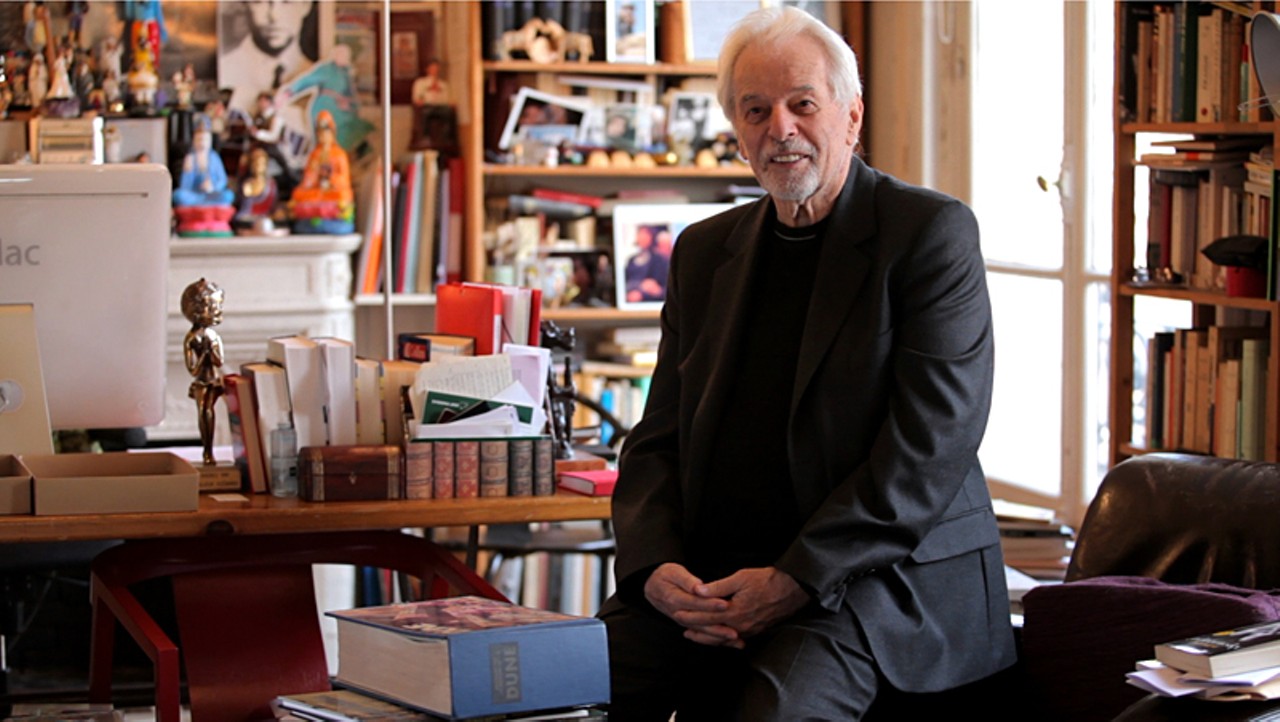 How, on God’s green earth, is the studio exec expected to give the green light to such a project? I’ll tell you how – AJ COMPROMISES. He promises he’ll make it three hours long. Or, he agrees to negotiate on the production budget. Or, he says, “Sure, Gene Hackman can be in the film.” Or, he lets go a piece of the pie, but not the whole thing. In other words, I understand filmmakers like AJ, I appreciate their efforts and respect their works – even if I don’t like their films. But, I feel they lack the understanding that, at its core, cinema is about collaboration. And, if AJ really wanted to make Dune, why not spend his own millions, like Coppola did? Or recruit more European funds – they got it all figured out over there, right?
How, on God’s green earth, is the studio exec expected to give the green light to such a project? I’ll tell you how – AJ COMPROMISES. He promises he’ll make it three hours long. Or, he agrees to negotiate on the production budget. Or, he says, “Sure, Gene Hackman can be in the film.” Or, he lets go a piece of the pie, but not the whole thing. In other words, I understand filmmakers like AJ, I appreciate their efforts and respect their works – even if I don’t like their films. But, I feel they lack the understanding that, at its core, cinema is about collaboration. And, if AJ really wanted to make Dune, why not spend his own millions, like Coppola did? Or recruit more European funds – they got it all figured out over there, right?
But, no. Jodorowsky’s Dune lives only in that huge, phone book sized pre-production manual. And let me say, this pre-production catalogue is only one of several things that this film inspired. Director Nicholas Winding Refn discusses it as AJ showed it to him when he had dinner at the guy’s house. The guys that AJ had hired for Dune were recruited for Ridley Scott’s Alien – and won Oscars for their work in visual effects! And many of the costumes and characters were visible in other sci-fi features for the next 30 years. Obviously, Pavich is crediting AJ with a lot, here. Me, while my vote is out on Mr. Jodorowsky, I think this doc is well worth a watch. The credit due AJ is a topic worth debating – and this post is already long enough!
